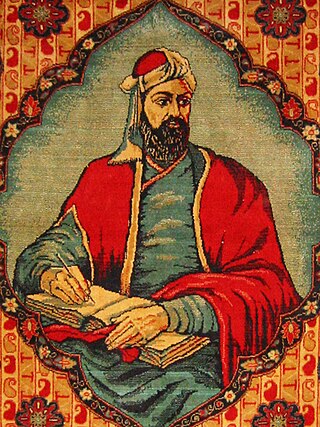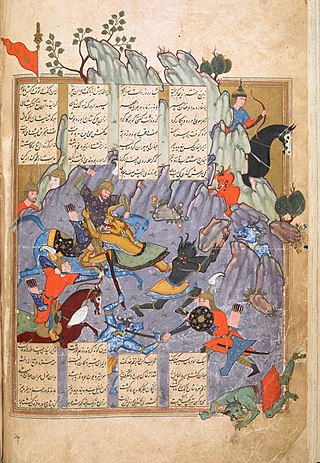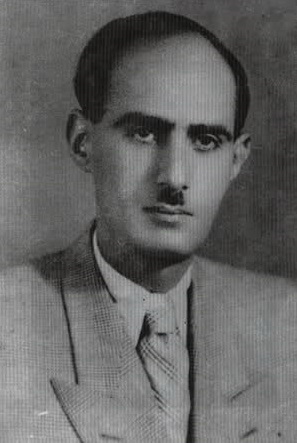Related Research Articles

Nizami Ganjavi, Nizami Ganje'i, Nizami, or Nezāmi, whose formal name was Jamal ad-Dīn Abū Muḥammad Ilyās ibn-Yūsuf ibn-Zakkī, was a 12th-century Muslim poet. Nezāmi is considered the greatest romantic epic poet in Persian literature, who brought a colloquial and realistic style to the Persian epic. His heritage is widely appreciated and shared by Afghanistan, Republic of Azerbaijan, Iran, the Kurdistan region and Tajikistan.

Abu Nasr Ali ibn Ahmad Asadi Tusi was a Persian poet, linguist and author. He was born at the beginning of the 11th century in Tus, Iran, in the province of Khorasan, and died in the late 1080s in Tabriz. Asadi Tusi is considered an important Persian poet of the Iranian national epics. His best-known work is Garshaspnameh, written in the style of the Shahnameh.

Amīr ash-Shu‘arā’ Abū Abdullāh Muḥammad b. ‘Abd al-Malik Mu‘izzī was a poet who ranks as one of the great masters of the Persian panegyric form known as qasideh.
Shu'ubiyya was a literary-political movement which opposed the privileged status of Arabs within the Muslim community and the Arabization campaigns particularly by the Ummayads. The vast majority of the Shu'ubis were Persian.

Afzal al-Dīn Badīl ibn ʿAlī ibn ʿOthmān, commonly known as Khāqānī, was a major Persian poet and prose-writer. He was born in Transcaucasia in the historical region known as Shirvan, where he served as an ode-writer to the Shirvanshahs. His fame most securely rests upon the qasidas collected in his Divān, and his autobiographical travelogue Tohfat al-ʿErāqayn. He is also notable for his exploration of the genre that later became known as habsiyāt.
Roy Parviz Mottahedeh is an American historian who is Gurney Professor of History, Emeritus at Harvard University, where he taught courses on the pre-modern social and intellectual history of the Islamic Middle East and is an expert on Iranian culture. Mottahedeh served as the director of Harvard's Center for Middle Eastern Studies from 1987 to 1990, and as the inaugural director of the Prince Alwaleed Bin Talal Islamic Studies Program at Harvard University from 2005 to 2011. He is a follower of the Baha'i faith.

Allameh Tabataba'i University is the largest and the leading specialized public university in humanities and social sciences in Iran. With 15,624 students and 422 full-time faculty members the university is under the supervision of Ministry of Science, Research and Technology is named in honor of Allameh Tabataba'i, a prominent Iranian sage and philosopher.

Homa Katouzian is an economist, historian, sociologist and literary critic, with a special interest in Iranian studies. Katouzian's formal academic training was in economics and the social sciences but he concurrently continued his studies of Persian history and literature at a professional academic level. He began studying the life and works of the modern Persian writer, Sadeq Hedayat, and that of the Prime Minister of Iran in the early 1950s, Mohammad Mosaddeq, while still a faculty member in the department of economics at the University of Kent at Canterbury. Having taught economics at universities in Britain and other countries for eighteen years, he took voluntary retirement in 1986 to devote his entire time to Iranian studies. In recent years, he has been teaching and writing on classical Persian literature, in particular the 13th-century poet and writer, Sa‘di. Currently based at the University of Oxford, Katouzian is a member of the Faculty of Oriental Studies and the Roshan Institute Academic Visitor in Iranian Studies at St. Antony's College, where for thirteen years he edited the bimonthly Iranian Studies, the journal of the Association for Iranian Studies. He is editor of the International Journal of Persian Literature, and co-editor of Routledge's Iranian studies book series. He is also a former member of the editorial board of Comparative Studies of South Asia, Africa and the Middle East and Comparative Economic Studies.
Safīna-yi Tabrīz is an important encyclopedic manuscript from 14th century Ilkhanid Iran compiled by Abu'l Majd Muhammad ibn Mas'ud Tabrizi between 1321 and 1323.
Hossein Ziai was a professor of Islamic Philosophy and Iranian Studies at UCLA where he held the inaugural Jahangir and Eleanor Amuzegar Chair in Iranian Studies until his passing. He received his B.S. in Intensive Physics and Mathematics from Yale University in 1967 and a Ph.D. in Islamic Philosophy from Harvard University in 1976. Prior to UCLA, Ziai taught at Tehran University, Sharif University, Harvard University, Brown University, and Oberlin College. As Director of Iranian Studies at UCLA, where he taught since 1988, Ziai established an undergraduate major in Iranian in the Department of Near Eastern Languages and Cultures—the first such degree in North America—and developed the strongest and most rigorous Iranian Studies program in the U.S.

Seyed Karim Amiri Firuzkuhi, with the nom de plume, "Amir", was a renowned Iranian poet.
Khorāsānī style was a movement in Persian poetry associated with the court of the Ghaznavids, associated with Greater Khorasan.
The Persian term for riddle is chīstān, literally 'what is it?', a word that frequently occurs in the opening formulae of Persian riddles. However, the Arabic loan-word lughaz is also used. Traditional Persian rhetorical manuals almost always handle riddles, but Persian riddles have enjoyed little modern scholarly attention. Yet in the assessment of A. A. Seyed-Gohrab, 'Persian literary riddles provide us with some of the most novel and intricate metaphors and images in Persian poetry'.

Zhaleh Alamtaj Ghaemmaghami was one of the first Iranian female poets who showed her feminist attitudes in her poetry. The book Mirror of Dew was the first translation of her poems into English.
Badr Shirvani was a Persian poet. He spent most of his career at the court of the Shirvanshahs, but received patronage from other rulers as well.

The Najaf Seminary, also known as the al-Hawza Al-Ilmiyya, is the oldest and one of the most important Shia seminaries (hawza) in the world. It is located near the Imam Ali Mosque in the city of Najaf in Iraq, and also operates a campus in Karbala, Iraq. It was established by Shaykh al-Tusi, and continued as a center of study after the establishment of modern Iraq in 1921.
Research Institute for Islamic Culture and Thought is an Iranian Research institute whose main purpose is theorizing on religious thought and enhancing the epistemological bases of the Islamic Revolution. The institute has departments of philosophy, mysticism, and ethics, as well as Western Studies and Islamic economy among others.
Rebecca Ruth Gould is a writer, translator, and Distinguished Professor, Comparative Poetics & Global Politics at SOAS University of London. Her interests range across the Caucasus, Comparative Literature, Islam, Islamic Law, Islamic Studies, Persian literature, poetry, and poetics. Her PhD dissertation focused on Persian prison poetry, and was published in revised form as The Persian Prison Poem: Sovereignty and the Political Imagination (2021). Her articles and translations have received awards from English PEN, the International Society for Intellectual History’s Charles Schmitt Prize, the Modern Language Association’s Florence Howe Award for Feminist Scholarship, and the British Association for American Studies’ Arthur Miller Centre Essay Prize. Gould's work also deals with legal theory and the theory of racism, and she is a critic of the International Holocaust Remembrance Alliance's Working Definition of Antisemitism.

Leyla Rouhi is an Iranian-American literary scholar and Mary A. and William Wirt Warren Professor of Romance Languages at Williams College. She is known for her expertise on comparative literature.
Ali-Asghar Seyed-Ghorab is an Iranian literary scholar and Professor of Persian and Iranian Studies at Utrecht University. Previously, he was Associate Professor of Persian Language and Literature in the Department of Middle Eastern Studies at Leiden University. He is a fellow of the Young Academy of the Royal Netherlands Academy of Arts and Sciences. In 2023 he was elected a member of the Royal Netherlands Academy of Arts and Sciences.
References
- ↑ "THE IRANIAN REVOLUTION: THIRTY YEARS" (PDF).
- ↑ Farridnejad, Shervin (3 December 2018). "Trends in Iranian and Persian Linguistics". Bibliographia Iranica.
- ↑ m, Dziekan (2017). "No Tapping around Philology". Rocznik Orientalistyczny/Yearbook of Oriental Studies.
- ↑ "Alireza Korangy" (PDF). North American Association of Islamic and Muslim studies.
- ↑ Gould, Rebecca (4 March 2015). "Development of the Ghazal and Khāqānī's Contribution: A Study of the Development of Ghazal and a Literary Exegesis of a 12th c. Poetic Harbinger". Iranian Studies. 48 (2): 302–305. doi:10.1080/00210862.2014.1001180. ISSN 0021-0862. S2CID 162326945.
- ↑ Gould, Rebecca (1 April 2015). "The Geographies of ͨAjam: The Circulation of Persian Poetry from South Asia to the Caucasus". The Medieval History Journal. 18 (1): 87–119. doi:10.1177/0971945814565729. ISSN 0971-9458. S2CID 54740492.
- ↑ Seyed-Gohrab, Ali-Asghar (2015). "Review of Development of the Ghazal and Khāqānī's Contribution: A Study of the Development of Ghazal and a Literary Exegesis of a 12th c. Poetic Harbinger". Journal of the Royal Asiatic Society. 25 (3): 519–521. doi:10.1017/S1356186314000807. ISSN 1356-1863. JSTOR 24755960.
- ↑ Omidsalar, Mahmud (8 February 2017). "Korangy, A., Thackson, W.M., Mottahedeh, R.P., Granada, W. (Eds), Essays in Islamic Philology, History, and Philosophy, Studies in the History and Culture of the Middle East, De Gruyter, Berlin, 2016". Anaquel de Estudios Árabes. 28: 222–224. doi: 10.5209/ANQE.55203 .